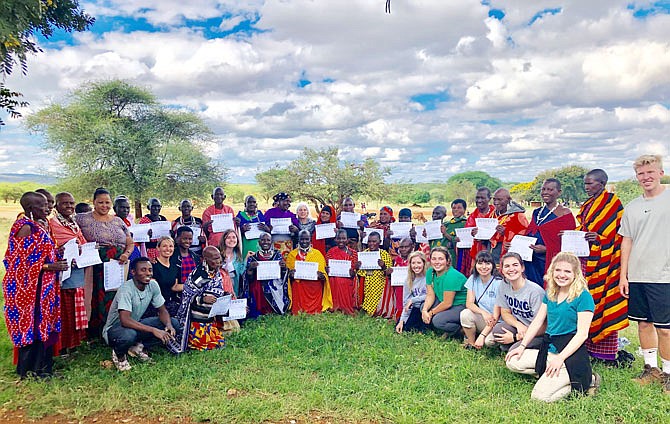A partnership between Fulton Rotary Club, Babati Rotary Club and Missouri-based charity Humanity for Children could save lives in rural Tanzania.
In conjunction with two Tanzania-based groups, the three have landed a $94,000 Global Grant to increase the survival rate of mothers, newborns and infants among the Maasai people in a remote area of Northern Tanzania.
"We're providing simple skills to help increase survival rates and building trust with local health care providers," said Amanda Gowin, Fulton Rotary Club member and project co-director.
Humanity for Children has a long history in the region already.
"We've been working in Tanzania for at least 10 years, mostly in the area of maternal newborn and infant health," said Bob Hansen, president of HFC's board of directors. "People from that area came to us and said we're losing too many moms during pregnancy, childbirth and shortly afterwards."
The Maasai people, a nomadic tribe known for herding cattle, are uniquely vulnerable in Tanzania's population. Hansen said the Tanzanian government forced the Maasai to settle in small villages with mud huts, no electricity and little access to health care. HFC chose to focus on two particularly remote villages.
"I feel like Fulton is kinda in the middle of nowhere in the United States, and here we are working with communities in the middle of nowhere in Tanzania," Gowin said.
HFC's research uncovered eight reasons the maternal mortality rate was so high, Hansen said.
Those ranged from obvious ones, such as distance from clinics and unhygienic birthing practices, to less-obvious, including malaria and lack of menstrual education among young girls.
"Our menstruation initiative isn't tied directly to this grant, but it is related," Gowin said. "One of the challenges for girls is that during their menstrual cycle, they don't have supplies and end up staying home."
Month by month, the girls fall further behind in their studies, and many end up dropping out, marrying and having children long before their bodies are fully matured. One of the team's initiatives involves distributing reusable menstrual pads and education to break the taboo around periods.
Addressing those many factors requires a many-pronged plan and lots of money. That's where Rotary stepped in. Fulton Rotary Club, of which Hansen is a member, teamed up with Tanzania-based Babati Rotary to prepare an ambitious grant application. It took three years of hard work, Gowin said.
"This is the first time we've received an international grant since I've been a Rotarian," Gowin said. "It feels good to be part of a small organization doing such big work."
Hansen said the project is dedicated to Mike Beahon, former Fulton Rotary Club president and district governor, who travelled to Tanzania in 2009 and 2010.
"It was his dream that our club would make a difference among the Maasai people," he said.
The money was awarded this summer, and preparation is now underway to spend the next 30 months transforming maternal and infant health care in the two villages.
Initiatives within the project include:
Training traditional birth attendants in safe-birthing practices.
Installing solar panels and a basic clinical lab at two remote government clinics.
Distributing safe-birthing kits (which contain items such as tarps, gloves and a receiving blanket) and anti-malarial mosquito nets.
Creating four educational videos on safe birthing, the importance of pre- and post-natal care, men's role in supporting safe birthing practices and a "first 1,000 days survival guide."
The employment and training of a community health educator, and creation of community advisory groups in the two villages.
Hansen and Gowin plan on visiting the project site three times during the next 30 months to help guide the grant's implementation.
"Once you visit, you're hooked," Gowin said.
Gowin emphasized the importance of working with local leaders to ensure sustainable results.
"It's not just us coming in - it's (local leaders and health care providers') idea, and we're helping to support it," Gowin said.
Working with traditional birth attendants, rather than discouraging the practice of home births, he said, is a big part of that effort toward sustainability.
"It's in their culture for women to deliver in their homes," Gowin said. "By training the traditional birth attendants, we're adding to that culture."
There are plenty of opportunities for Fulton residents to help in executing this initiative. One local group, led by Brenda Rose and Mary Osburn, has donated more than 1,000 handmade receiving blankets to HFC over the years. Donations of medical equipment for the birthing kits and money are also welcome.
To learn more or help, reach out to the Fulton Rotary Club or visit humanityforchildren.org/contact.

